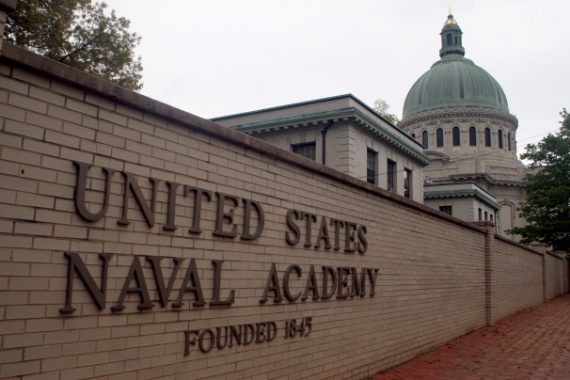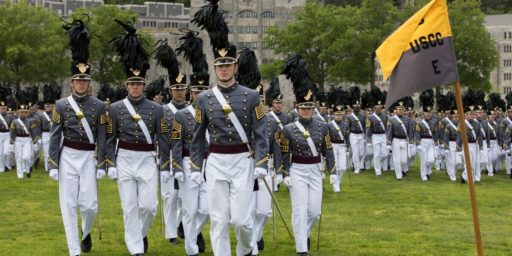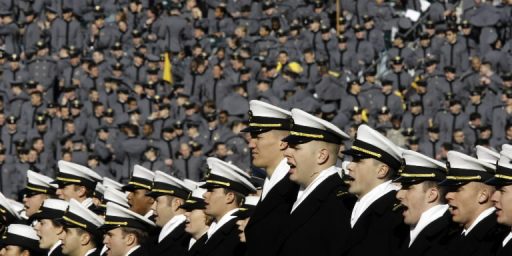Naval Academy’s Culture Problem
The long investigation into rape at the Naval Academy has revealed some ugly truths.
The long investigation into rape at the Naval Academy has revealed some ugly truths about its culture.
WaPo (“Rape hearing offers an unflattering glimpse of Naval Academy culture“):
The hearing, which concluded Tuesday, will determine whether the case goes to a court-martial. Its outcome is still weeks away, but the testimony provided a sometimes unflattering glimpse into the culture of the Naval Academy, one of the country’s storied training grounds for military leaders.
The 11 midshipmen who took the witness stand described a world of binge drinking, casual sex, social-media harassment and lying — behaviors that can be found on any other college campus. But for some academy alumni, it was a disturbing portrait of an institution that imposes strict rules on aspiring young officers whose educations are funded by U.S. taxpayers.
[…]
Still, the transgressions exposed at the hearing have some people questioning whether the pressures and constraints placed on midshipmen are part of the problem.
“There are a lot of needless restrictions,” said Bruce Fleming, an English professor who has taught at the academy for 27 years. As a result, “there is a ‘get back at the man’ mentality.”
A 2006 study of alcohol abuse at the Naval Academy found that a higher proportion of midshipman interviewed reported binge drinking in the previous six months than students at civilian colleges did over the course of a year. The participants blamed the limited opportunities to let loose, according to the study, which Lt. Cmdr. Lydia Doye, a Naval Academy graduate, conducted for her graduate-school thesis. This fueled a need to “make up for lost time,” the study said, and tended to “feed more intense drinking.”
The academy has been battling binge drinking for years, and officials said they have made progress. The number of midshipmen disciplined for alcohol-related incidents fell by 70 percent between 2010 and 2013, Schofield said.
Prohibitions against drinking extend to all freshmen, including those who are 21. Midshipmen cannot have alcohol in their dormitory, Bancroft Hall. The purpose of the rules is to mimic the conditions graduates will face once they are commissioned and deployed, academy officials said.
Midshipmen are policed as soon as they choose to attend. They are given a drug and alcohol test upon their induction, Schofield said. Any candidate with a blood alcohol count of .05 percent or above is sent for a medical evaluation. Anyone who tests positive for drugs is kicked out on the spot.
Since 2010, midshipmen have been subject to random breath tests. They also get an earful from an alcohol and drug education officer before and after summer leave, and before spring break.
Once a month, midshipmen turning 21 take part in “Responsible Use ’21st Birthday’ Dinner Training,” where they get up to two alcoholic drinks with dinner in a banquet room at the academy, learn how to compute their blood alcohol content and get a breath test.
The consequences for getting caught drunk or sneaking in a six-pack are demerits or, depending on the circumstances, expulsion.
Sex is also highly restricted. Male and female midshipmen have to keep the door open when they are in the same room in Bancroft Hall. And no sexual contact is allowed on the academy grounds. “That includes everything from hand-holding to the wildest orgies,” Fleming said.
To evade the rules, athletes on a number of teams pool their money and rent off-campus houses, where they can drink and have sex. Before it was shut down by academy officials, the Black Pineapple served as a retreat for the football players and their friends. Team members were renting the house on Witmer Court in Rolling Hills for $2,200 a month, according to an online ad posted about a year ago.
Fleming has argued for years that the unforgiving environment on campus leads to unintended consequences and that banning consensual sex undermines sexual-assault prevention efforts. Twenty percent of midshipmen are women.
“We can’t teach them about sexual assault when everything is tarred with the same moral brush,” he said.
While I agree with Fleming that the absurdly restrictive policies both incentivize bad behavior and blur the line between “the rules” and honorable conduct, there’s something else amiss here. The academies have had a no sex, no PDA policy going back to at least the early 1980s and probably from the first days of going co-ed in 1976. Similarly, there was no alcohol permitted in the barracks at West Point thirty years ago—and probably well before that—and cadets were essentially confined to the barracks, classrooms, parade grounds, and athletic fields during the week.
The MADD culture was just taking hold when I was a plebe in 1984 and members of the armed services—including cadets and midshipmen at the service academies—were permitted to consume alcohol on base regardless of age and the restrictions imposed by the state off base. There were classes Saturday morning and Monday through Friday. Saturday nights at Eisenhower Hall, which provided the only venue and opportunity to get beer, featured a lot of binge drinking. Cadets were only allowed to purchase one beer at a time, so the more enterprising would buy their beer and get back in line, consuming it on their way to the front.
Still, and at a time when attitude toward women in the military in general and women at the academy in particular were much less evolved, there was next to zero problem with sexual assault, much less rape. So something else is going on. And, for whatever reason, despite similar structures and policies, the Air Force and Naval academies have had much more of a problem than their Military counterpart.
Almost by definition, it’s a leadership problem. But the issues have persisted over a couple decades and a long line of superintendents and commandants at this point. So, there’s some cultural difference—whether in attitudes toward women or something else–that has to be solved. We’re at a point where the Secretary of Defense and Chairman of the Joint Chiefs—indeed, the Commander-in-Chief himself—are making this a top priority. One hopes they’ll get to the bottom of the problem and root it out.







What an amusing, antiquated, and discriminatory rule now that gays are permitted to serve openly in the military. Midshipmen can’t even give the appearance of the possibility of living as man and wife, but will be forced to live as man and man or wife and wife.
@JKB:
Careful JKB, your homophobia is showing.
@OzarkHillbilly:
Not homophobia. Just pointing out how the world has changed and the old rules don’t work anymore. There is no justification for requiring males and females in a berthing space to have the door open when there are other sexual orientations that are officially recognized. In the past, it was the polite lie of officially denying such orientations that highlighted the “risks” of males and females being in a room was different than same-sex individuals being in a room.
The world has changed and a lot of crappy little “morality” rules have to change with it. Either to be altered to be inclusive of newly recognized orientations or be done away with altogether
Not to mention, the article doesn’t address same-sex sexual harassment and rape which is a big problem in the military. And one where the service could be complicit in forcing the victim to room with their aggressor.
I’m just saying, let’s stop ignoring the fact that the world has changed. Embrace the diversity and be inclusive, even in dealing with the ugly problems of humans being forced to live in close quarters.
I trust you saw Col. Haring’s piece over at Tom Ricks’ blog. This is clearly an institutional problem that is longstanding. It was probably a problem when you were serving, but just didnt know about it is my guess.
http://ricks.foreignpolicy.com/posts/2013/09/05/a_cols_view_of_commanders_authority
“Not to mention, the article doesn’t address same-sex sexual harassment and rape which is a big problem in the military.”
Citation please. Not true AFAICT.
Steve
@steve:
In Debate Over Military Sexual Assault, Men Are Overlooked Victims
I would note, however, this isn’t a GLBT issue any more than prison rape is. It’s about dominance, not a sincere attraction to other men.
Here’s one obvious reason for the cultural differences between Annapolis and West Point: Annapolis isn’t Gotham City, but it’s fairly large and the capital of a state. There are bars, places to stay that are out of sight (and places to rent). It invites anonymity and opportunity.
Ever try to get into real trouble in Highland Falls, New York?
@T. O’Neill: That’s a fair point except that, at least in my day, cadets weren’t allowed off reservation during the week and, even on the weekends, one needed a pass to leave base. Combined with the fact that only Firsties (seniors) had cars, it was something of a non-factor.
@JKB: JKB, when you say
that is homophobia No matter how you try, you can’t turn that sow’s ear into a silk purse.
@OzarkHillbilly:
It was a joke. If they are so afraid a male and a female in a room with the door closed will play house, why wouldn’t they have the same fear about two males or two females in a room with the door closed? In the past homosexuality wasn’t officially acknowledged but now it is officially accepted in the military. So someone needs to explain why heterosexuals need closer monitoring and can’t be trusted.
But yes, right now, midshipmen are force to live with others of the same sex regardless of their sexual orientation. So why separate males and females?
So, it’s everyone’s fault except the rapists? (that question being directed at The Washington Post, not James)
There’s a lot of people out there who would gladly trade all the restrictions that the Naval Academy imposes on its cadets for a free four-year education, along with a commission as a Second Lieutenant/Ensign which gets you $34,516.80 a year.
@James Joyner: How true. “My day” was 1975-1992 on the faculty and as a frequent visitor and consultant emeritus since. That’s a lot of mileage. My own view is that a lot of changes were ill-considered–but I’m old (69), so every change looks ill-considered.
But one point I don’t see being made here: What is the role of corps squad football culture as opposed to general Academy ways and means? Lightning may strike me, but this is and has been for decades one of the factors that drives us off mission. Yes, the cadets/midshipmen are responsible for their behavior (there is no logic in expecting them to grow up suddenly after they are commissioned). But there is a basic principle of psychology: we are what we are reinforced for being. Institutionally, how do we rate in that way?
So many people try to hide their prejudice and bigotry behind “jokes”…
@An Interested Party:
And some people cry prejudice and bigotry to avoid open and honest discussion of a real topic.
FWIW, when I lived in Baltimore from 95-00 there was a fairly constant drumbeat of scandals coming from the Naval Academy. I remember cheating and of course football related scandals but half-remember that there were others. There was at least one that involved coverup by very high ranking officials and my recollection was that the coverups were so obvious they bordered on the contemptuous, ala “We all know I am just going through the motions here, but we all know you can’t take the real truth.”
This fueled a need to “make up for lost time,” the study said, and tended to “feed more intense drinking.”
Did anyone else catch that? I would say that’s a major factor right there. The fact that they feel the need to “catch up for lost time” indicates that there is a belief that drinking/partying is normal behavior to engage in a regular, routine manner instead of something to do for enjoyment. Back home in the civilian world, if you miss a weekend out with the guys due to circumstances, you don’t drink yourself blind at the next opportunity to make up for it. You say oh damn, oh well and move on. There are plenty of restrictions in place in civilian life that don’t make your average joe go crazy – that’s just an excuse for poor behavior and self control.
People who binge drink have specific habits and behaviors that differ from your average person. One is the overwhelming need to drink specifically to get drunk as fast as possible. This is part of the culture problem that needs to be looked at. When your cadets feel the need to be bombed as quickly as possible as often as possible, you might want to take a look at what kind of people you have running around the place.
You can have a drink or two without getting drunk. There is no need to get wasted just to get wasted.
A rule requiring a door stay open is ridiculous. I do think there seems to be an overly restrictive view of sexual relationships.
Drinking attitudes seem to be a part of the problem as well. I still do not understand why we have a 21 drinking age-18 year olds can vote and fight in wars they should be able to buy a beer. Seems like the smarter method to deal with drinking would be to allow it in campus in a controlled environment (drinking hall during certain hours/days for those of legal age).
Also, not sure how true this is but the article left me with the impression that midshipmen are constantly being preached at on drinking and sexual behavior. Having been a teen and having teens I recognize that sometimes harping on something too much just ends up resulting in the teens shutting down-they stop listening.
Though I haven’t got any evidence at hand to back it up, my experience during that same timeframe makes me strongly suspect that it has more to do with “next to zero reporting” rather than “next to zero problem“